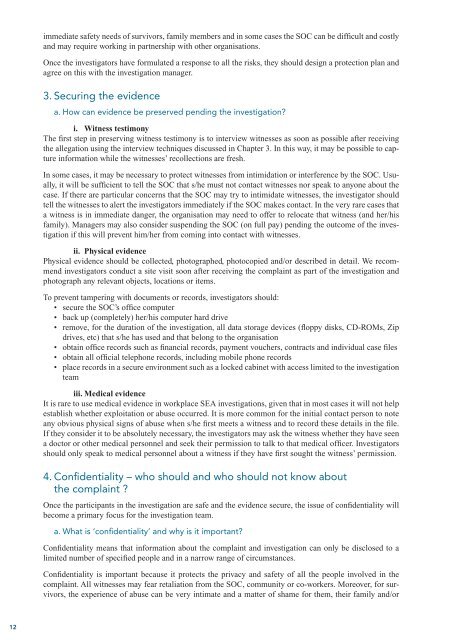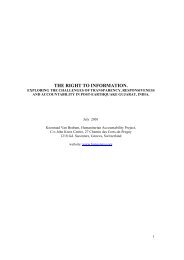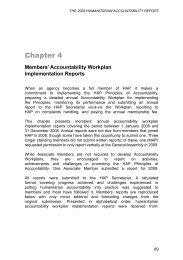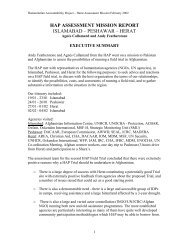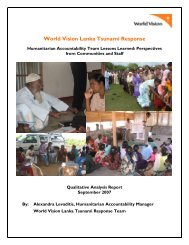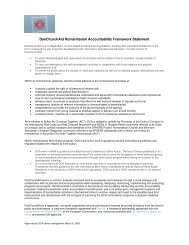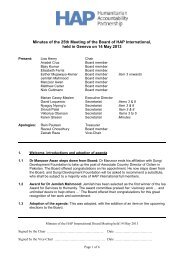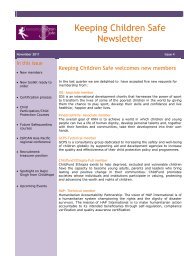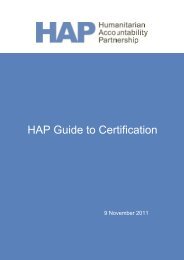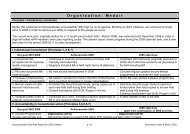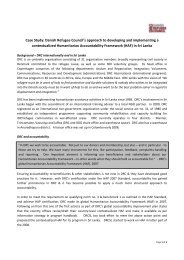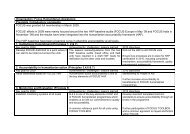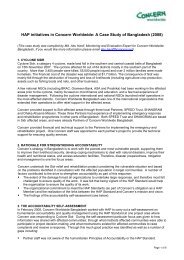Building Safer Organisations Guidelines - HAP International
Building Safer Organisations Guidelines - HAP International
Building Safer Organisations Guidelines - HAP International
Create successful ePaper yourself
Turn your PDF publications into a flip-book with our unique Google optimized e-Paper software.
immediate safety needs of survivors, family members and in some cases the SOC can be difficult and costly<br />
and may require working in partnership with other organisations.<br />
Once the investigators have formulated a response to all the risks, they should design a protection plan and<br />
agree on this with the investigation manager.<br />
3. Securing the evidence<br />
a. How can evidence be preserved pending the investigation?<br />
i. Witness testimony<br />
The first step in preserving witness testimony is to interview witnesses as soon as possible after receiving<br />
the allegation using the interview techniques discussed in Chapter 3. In this way, it may be possible to capture<br />
information while the witnesses’ recollections are fresh.<br />
In some cases, it may be necessary to protect witnesses from intimidation or interference by the SOC. Usually,<br />
it will be sufficient to tell the SOC that s/he must not contact witnesses nor speak to anyone about the<br />
case. If there are particular concerns that the SOC may try to intimidate witnesses, the investigator should<br />
tell the witnesses to alert the investigators immediately if the SOC makes contact. In the very rare cases that<br />
a witness is in immediate danger, the organisation may need to offer to relocate that witness (and her/his<br />
family). Managers may also consider suspending the SOC (on full pay) pending the outcome of the investigation<br />
if this will prevent him/her from coming into contact with witnesses.<br />
ii. Physical evidence<br />
Physical evidence should be collected, photographed, photocopied and/or described in detail. We recommend<br />
investigators conduct a site visit soon after receiving the complaint as part of the investigation and<br />
photograph any relevant objects, locations or items.<br />
To prevent tampering with documents or records, investigators should:<br />
• secure the SOC’s office computer<br />
• back up (completely) her/his computer hard drive<br />
• remove, for the duration of the investigation, all data storage devices (floppy disks, CD-ROMs, Zip<br />
drives, etc) that s/he has used and that belong to the organisation<br />
• obtain office records such as financial records, payment vouchers, contracts and individual case files<br />
• obtain all official telephone records, including mobile phone records<br />
• place records in a secure environment such as a locked cabinet with access limited to the investigation<br />
team<br />
iii. Medical evidence<br />
It is rare to use medical evidence in workplace SEA investigations, given that in most cases it will not help<br />
establish whether exploitation or abuse occurred. It is more common for the initial contact person to note<br />
any obvious physical signs of abuse when s/he first meets a witness and to record these details in the file.<br />
If they consider it to be absolutely necessary, the investigators may ask the witness whether they have seen<br />
a doctor or other medical personnel and seek their permission to talk to that medical officer. Investigators<br />
should only speak to medical personnel about a witness if they have first sought the witness’ permission.<br />
4. Confidentiality – who should and who should not know about<br />
the complaint ?<br />
Once the participants in the investigation are safe and the evidence secure, the issue of confidentiality will<br />
become a primary focus for the investigation team.<br />
a. What is ‘confidentiality’ and why is it important?<br />
Confidentiality means that information about the complaint and investigation can only be disclosed to a<br />
limited number of specified people and in a narrow range of circumstances.<br />
Confidentiality is important because it protects the privacy and safety of all the people involved in the<br />
complaint. All witnesses may fear retaliation from the SOC, community or co-workers. Moreover, for survivors,<br />
the experience of abuse can be very intimate and a matter of shame for them, their family and/or<br />
12


